Coronavirus (COVID-19) Myth Busters
WHO Advice for Public
Article Source: World Health Organization
World Health Organization (WHO) came into existence on 07 April 1948 and is committed for "Better health for everyone, everywhere". They are building a better, healthier future for people all over the world. They strive to combat diseases – communicable diseases like influenza and HIV, and noncommunicable diseases like cancer and heart disease.
During the current horrible Coronavirus pandemic, there are different rumors revolving around, from which some are true but largely they are only rumors, but these rumors are causing panic and uncertainty among the people. Just for general public interest and to spread the maximum awareness about this disease, Iftikhar University is trying to gather in this article all the Myths about Coronavirus and their detailed explanations as given by the World Health Organization on their website. We are publishing here all their questions-answers related to these myths without any change to avoid any misinterpretation or errors.
SOME MYTH BUSTERS ABOUT CORONAVIRUS AND WHO ADVICE FOR PUBLIC:
1. COVID-19 virus can be transmitted in areas with hot and humid climates
 |
| Image Credit: World Health Organization |
From the evidence so far, the COVID-19 virus can be transmitted in ALL AREAS, including areas with hot and humid weather. Regardless of climate, adopt protective measures if you live in, or travel to an area reporting COVID-19. The best way to protect yourself against COVID-19 is by frequently cleaning your hands. By doing this you eliminate viruses that may be on your hands and avoid infection that could occur by then touching your eyes, mouth, and nose.
2. Cold weather and snow CANNOT kill the new coronavirus.
 |
| Image Credit: World Health Organization |
There is no reason to believe that cold weather can kill the new coronavirus or other diseases. The normal human body temperature remains around 36.5°C to 37°C, regardless of the external temperature or weather. The most effective way to protect yourself against the new coronavirus is by frequently cleaning your hands with alcohol-based hand rub or washing them with soap and water.
3. Taking a hot bath does not prevent the new coronavirus disease
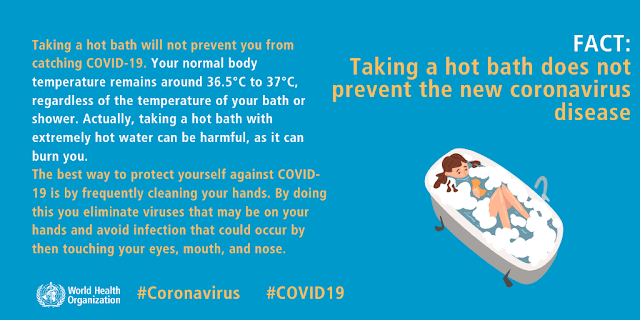 |
| Image Credit: World Health Organization |
Taking a hot bath will not prevent you from catching COVID-19. Your normal body temperature remains around 36.5°C to 37°C, regardless of the temperature of your bath or shower. Actually, taking a hot bath with extremely hot water can be harmful, as it can burn you. The best way to protect yourself against COVID-19 is by frequently cleaning your hands. By doing this you eliminate viruses that may be on your hands and avoid infection that could occur by then touching your eyes, mouth, and nose.
4. The new coronavirus CANNOT be transmitted through mosquito bites.
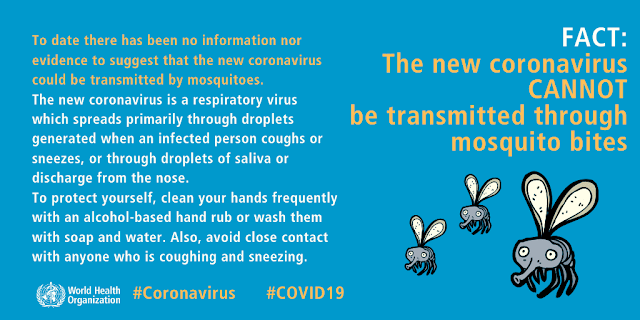 |
| Image Credit: World Health Organization |
To date, there has been no information nor evidence to suggest that the new coronavirus could be transmitted by mosquitoes. The new coronavirus is a respiratory virus which spreads primarily through droplets generated when an infected person coughs or sneezes, or through droplets of saliva or discharge from the nose. To protect yourself, clean your hands frequently with an alcohol-based hand rub or wash them with soap and water. Also, avoid close contact with anyone who is coughing and sneezing.
5. Are hand dryers effective in killing the new coronavirus?
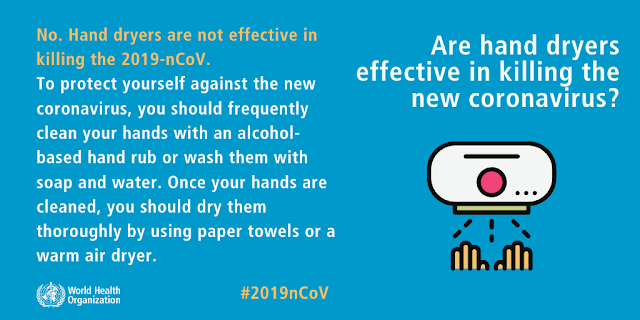 |
| Image Credit: World Health Organization |
No. Hand dryers are not effective in killing the 2019-nCoV. To protect yourself against the new coronavirus, you should frequently clean your hands with an alcohol-based hand rub or wash them with soap and water. Once your hands are cleaned, you should dry them thoroughly by using paper towels or a warm air dryer.
6. Can an ultraviolet disinfection lamp kill the new coronavirus?
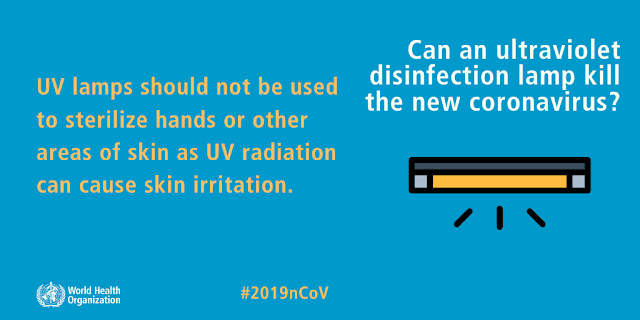 |
| Image Credit: World Health Organization |
UV lamps should not be used to sterilize hands or other areas of skin as UV radiation can cause skin irritation.
7. How effective are thermal scanners in detecting people infected with the new coronavirus?
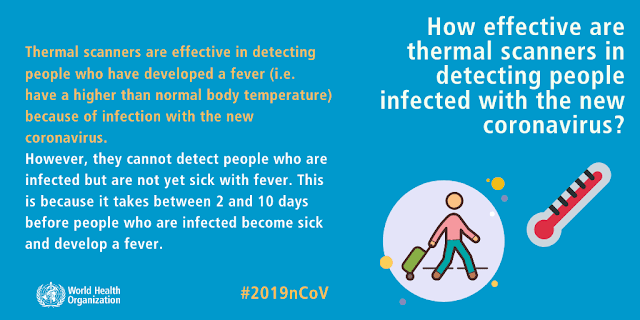 |
| Image Credit: World Health Organization |
Thermal scanners are effective in detecting people who have developed a fever (i.e. have a higher than normal body temperature) because of infection with the new coronavirus.
However, they cannot detect people who are infected but are not yet sick with fever. This is because it takes between 2 and 10 days before people who are infected become sick and develop a fever.
However, they cannot detect people who are infected but are not yet sick with fever. This is because it takes between 2 and 10 days before people who are infected become sick and develop a fever.
8. Can spraying alcohol or chlorine all over your body kill the new coronavirus?
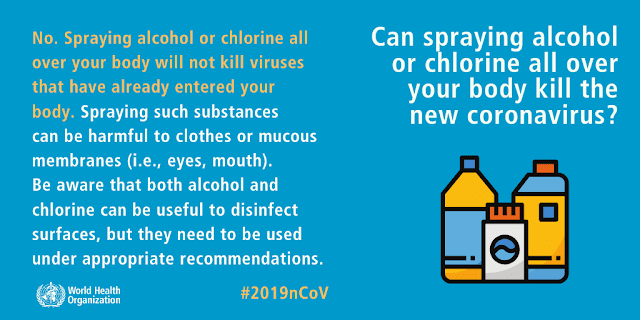 |
| Image Credit: World Health Organization |
No. Spraying alcohol or chlorine all over your body will not kill viruses that have already entered your body. Spraying such substances can be harmful to clothes or mucous membranes (i.e. eyes, mouth). Be aware that both alcohol and chlorine can be useful to disinfect surfaces, but they need to be used under appropriate recommendations.
9. Do vaccines against pneumonia protect you against the new coronavirus?
 |
| Image Credit: World Health Organization |
No. Vaccines against pneumonia, such as pneumococcal vaccine and Haemophilus influenza type B (Hib) vaccine, do not provide protection against the new coronavirus.
The virus is so new and different that it needs its own vaccine. Researchers are trying to develop a vaccine against 2019-nCoV, and WHO is supporting their efforts.
Although these vaccines are not effective against 2019-nCoV, vaccination against respiratory illnesses is highly recommended to protect your health.
The virus is so new and different that it needs its own vaccine. Researchers are trying to develop a vaccine against 2019-nCoV, and WHO is supporting their efforts.
Although these vaccines are not effective against 2019-nCoV, vaccination against respiratory illnesses is highly recommended to protect your health.
10. Can regularly rinsing your nose with saline help prevent infection with the new coronavirus?
 |
| Image Credit: World Health Organization |
No. There is no evidence that regularly rinsing the nose with saline has protected people from infection with the new coronavirus.
There is some limited evidence that regularly rinsing nose with saline can help people recover more quickly from the common cold. However, regularly rinsing the nose has not been shown to prevent respiratory infections.
There is some limited evidence that regularly rinsing nose with saline can help people recover more quickly from the common cold. However, regularly rinsing the nose has not been shown to prevent respiratory infections.
11. Can eating garlic help prevent infection with the new coronavirus?
 |
| Image Credit: World Health Organization |
Garlic is a healthy food that may have some antimicrobial properties. However, there is no evidence from the current outbreak that eating garlic has protected people from the new coronavirus.
12. Does the new coronavirus affect older people, or are younger people also susceptible?
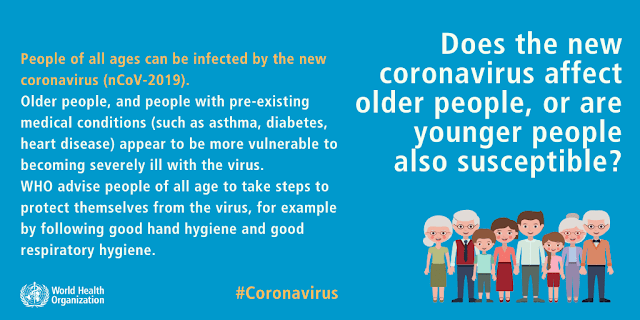 |
| Image Credit: World Health Organization |
People of all ages can be infected by the new coronavirus (2019-nCoV). Older people, and people with pre-existing medical conditions (such as asthma, diabetes, heart disease) appear to be more vulnerable to becoming severely ill with the virus.
WHO advises people of all ages to take steps to protect themselves from the virus, for example by following good hand hygiene and good respiratory hygiene.
WHO advises people of all ages to take steps to protect themselves from the virus, for example by following good hand hygiene and good respiratory hygiene.
13. Are antibiotics effective in preventing and treating the new coronavirus?
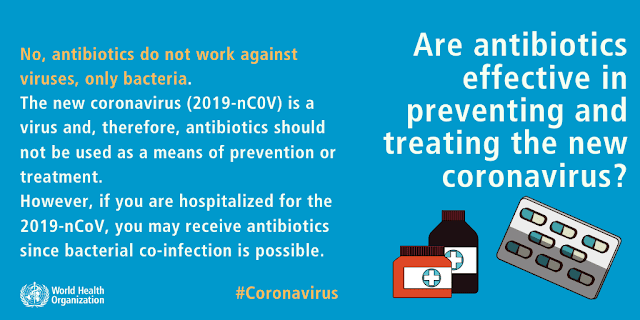 |
| Image Credit: World Health Organization |
No, antibiotics do not work against viruses, only bacteria.
The new coronavirus (2019-nCoV) is a virus and, therefore, antibiotics should not be used as a means of prevention or treatment.
However, if you are hospitalized for the 2019-nCoV, you may receive antibiotics because bacterial co-infection is possible.
The new coronavirus (2019-nCoV) is a virus and, therefore, antibiotics should not be used as a means of prevention or treatment.
However, if you are hospitalized for the 2019-nCoV, you may receive antibiotics because bacterial co-infection is possible.
14. Are there any specific medicines to prevent or treat the new coronavirus?
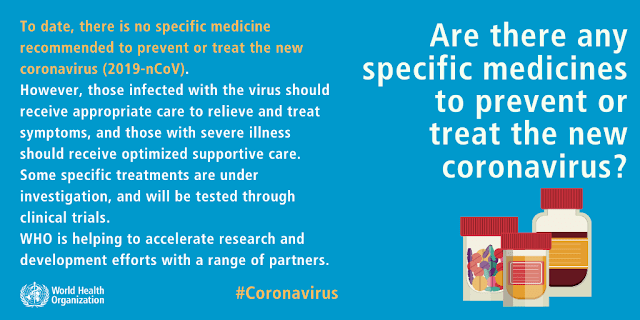 |
| Image Credit: World Health Organization |
To date, there is no specific medicine recommended to prevent or treat the new coronavirus (2019-nCoV).
However, those infected with the virus should receive appropriate care to relieve and treat symptoms, and those with severe illness should receive optimized supportive care. Some specific treatments are under investigation and will be tested through clinical trials. WHO is helping to accelerate research and development efforts with a range or partners.
However, those infected with the virus should receive appropriate care to relieve and treat symptoms, and those with severe illness should receive optimized supportive care. Some specific treatments are under investigation and will be tested through clinical trials. WHO is helping to accelerate research and development efforts with a range or partners.
Also, Read This Related Article:
Coronavirus Overview, its Symptoms, Prevention and Treatment
Also, check the following 100% Free Udemy Courses:
Excel Basics Helpful Tips & Formulas for Excel
The Complete Video Production & Video Marketing Course 2020
Internet and Web Development Fundamentals
Create Images, Videos and Web Pages Using Adobe Spark 2019
The Webmaxing Free Online SEO Basics Course (2019)
Excel Basics Helpful Tips & Formulas for Excel
The Complete Video Production & Video Marketing Course 2020
Internet and Web Development Fundamentals
Create Images, Videos and Web Pages Using Adobe Spark 2019
The Webmaxing Free Online SEO Basics Course (2019)
How to Build a Powerful Memory
Easy Little Habits, Great Health Benefits
5-WeekHealthy Detox Plan To Lose Weight
Get Your First SEO Client Using Freelance Sites
SEO Tutorial Step By Step
If you liked this post, do share it with others and also comment your suggestions and opinions. Please explore this blog for useful tutorial, courses, softwares, articles, etc.
You can also comment any online course or any software or any questions or concerns related to online learning and Information Technology, we will do our best to provide you the material of your choice. Happy Learning with Iftikhar University.
Please also Like our Facebook Page
Thank you for your support and valuable time to read this post.



Post a Comment Blogger Facebook
Please do not use spam links in the comment box.